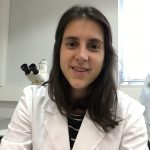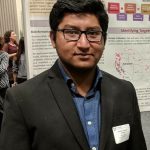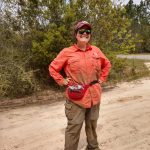The Department of Biological Sciences is the academic home of diverse researchers at a variety of career stages. Among these are postdoctoral researchers, early-career individuals who have earned a Ph.D. and who are continuing their training by working in collaboration with a faculty mentor. Postdocs are not students but colleagues-in-training who often teach their mentors just as much as their mentors teach them. Postdoctoral positions are typically research-focused, but these individuals also make valuable contributions to teaching, training students, and outreach, just to name a few. Ask any faculty mentor about their postdoctoral colleague and you will undoubtedly hear an emphatically positive answer about how bright, enthusiastic, hard-working, dedicated, and generous with their time these individuals are. Postdocs play a big part in the continued success of our department but are all too often unsung heroes.
In this issue of the Bama Biology Newsletter, we wanted to highlight some of our postdoctoral researchers and research associates to recognize their valuable contributions in and outside of the lab.
Dr. Carmen Cobo is a postdoctoral researcher in the Kocot Lab. She did her Ph.D. at the University of Santiago de Compostela in Spain where she also worked as a researcher at both the Marine Biology and Hydrobiological field stations. Her research is focused on biodiversity and systematics of Solenogastres (Mollusca, Aplacophora), with special interest in the deep-sea fauna; she has described eight species and a new genus of abyssal solenogasters to date. Currently, she is working on a project titled, “Revolutionizing Biodiversity and Systematics Research on Aplacophora (Mollusca) and Training the Next Generation of Invertebrate Systematists.”
When she is not doing science, she is reading or looking for the best fishing spot. Sailing is another of her passions, her little vintage sailboat is waiting for her on the other side of the Atlantic.
Dr. Sasha Greenspan is a research associate in the Becker Lab. She did her Master’s at the University of Maine and her Ph.D. at James Cook University in Australia. Her research is focused on amphibian disease ecology and global change in Brazil. Since coming to UA, she has centered her work on effects of pathogens and climate on the amphibian microbiome.
Outside of work, Sasha enjoys exploring Alabama waterfalls, finding cool salamanders, cooking, and cuddling with her two dogs, Hobart and Hyla.
Dr. Victoria Pocius is a postdoctoral researcher in the Kersch-Becker Lab. She did her Ph.D. in the Debinski Lab at Iowa State University investigating monarch butterfly preference and performance across eight native milkweed species. After completing her doctoral training, she gained additional expertise in chemical ecology and insect physiology through additional training in the labs of Jared Ali and Rudolf Schilder at Penn State. As a member of the Kersch-Becker lab, Tori is excited to be working on the interactions between plant defenses, prey quality, and predator/parasitoid attraction, retention, and fitness.
Outside of the lab, Tori is passionate about science communication, competitive swimming, and baking.
Dr. Sarthok Rahman is a postdoctoral researcher in the Lozier Lab. He has just completed his Ph.D. (2021) in the Hines Lab at Pennsylvania State University where he investigated the genetic basis of mimetic color variation in bumble bees and was part of the multidisciplinary diverse team introducing bumble bees as a new model system for evolutionary genetics. As the newest member of the Lozier lab, Sarthok is excited to be working with Dr. Jeff Lozier and collaborator Dr. Janna Fierst on their Understanding the Rules of Life NSF grant to discover the epigenetic mechanisms of cold tolerance across elevations in West American bumble bees.
Outside of the lab, Sarthok is passionate about science communication, tea, cricket, and cooking authentic Indian subcontinent dishes.
Dr. Shelby Rinehart is a postdoctoral researcher in the Cherry Lab. Shelby received their Ph.D. in 2018 from the San Diego State University and University of California Davis Joint Doctoral Program in Ecology and recently finished their first postdoctoral position at the Hebrew University of Jerusalem in Israel. Their research program aims to use food webs in tidal marshes, semi-arid deserts, and sandy shores to understand the links between trophic diversity and ecosystem structure and function.
When Shelby is not falling down in salt marshes, they can be found scoping out comedy and drag shows, learning about local history, and pampering their two fat cats.
Dr. Corianne Tatariw joined the Mortazavi Lab as a postdoctoral researcher in 2016. She did her Ph.D. at the University of Maine on the impacts of human disturbances on nutrient cycling in forest soils. Her current research is focused on nutrient removal in natural and human created wetlands, with the goal of understanding how these ecosystems can improve water quality. Her work includes investigating the long-term impacts of the Deepwater Horizon spill on salt marshes in the northern Gulf of Mexico and identifying the drivers of nitrogen removal in created wetlands.
When she is not at work, she can be found in the kitchen in pursuit of the perfect chocolate chip cookie recipe or absorbed in a mystery novel.





